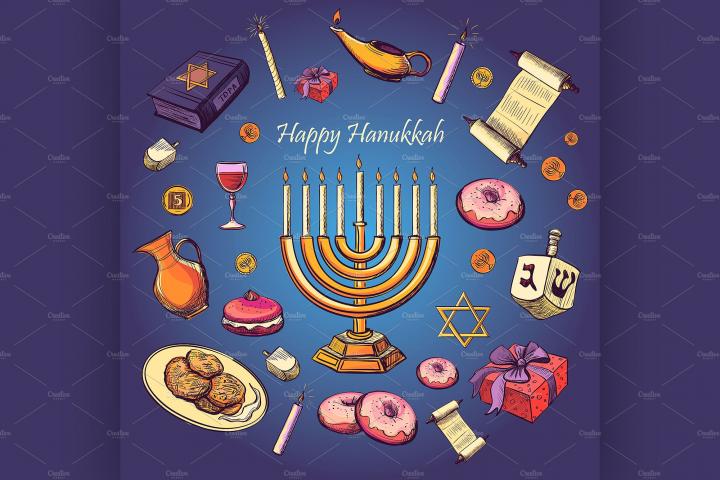A festival in Judaism that occurs each December. Hanukkah commemorates the victory of the Jews (see also Jews) in the second century b.c. over the Syrians, who had occupiedtheir country, and the rededication of the Temple in Jerusalem (see also Jerusalem) (hanukkah is Hebrew for “dedication”). Observers of Hanukkah light one candle in a candleholder called a menorah each night for eight nights in memory of a legend that,when the Temple was rededicated, its lamps burned, without enough oil, miraculously fora week.
 This post was edited by Beans/SilentGeneration at December 7, 2018 11:51 PM MST
This post was edited by Beans/SilentGeneration at December 7, 2018 11:51 PM MST
The Hanukkah celebration revolves around the kindling of a nine-branched menorah, known in Hebrew as the hanukiah.
On each of the holiday’s eight nights, another candle is added to the menorah after sundown; the ninth candle, called the shamash (“helper”), is used to light the others. Devout Jews recite blessings during this ritual and display the menorah prominently in a window as a reminder to others of the miracle that inspired the holiday.
In another allusion to the Hanukkah miracle, traditional Hanukkah foods are fried in oil. Potato pancakes (known as latkes) and jam-filled donuts (sufganiyot) are particularly popular in many Jewish households. Other Hanukkah customs include playing with four-sided spinning tops called dreidels and exchanging gifts.
From a religious perspective, it commemorates the victory (won by war or civil war) of the right to practice the traditional faith
The Seleucid King Antiochus III took control of Judea (now Isreal) about 200 years before the common era. He allowed the Jews to live and worship according to their faith. But his is son, Antiochus IV Epiphanes, outlawed the Jewish religion and ordered the Jews to worship Greek gods. In 168 B.C., at his orders, his soldiers massacred thousands of Jews in Jerusalem. They then defiled the Second Temple by erecting an altar to Zeus and sacrificed pigs on the alter.
The Jewish priest Mattathias and his five sons led a resistance movement against Antiochus and the Seleucid monarchy. In 166 B.C., Mattathias's son Judah, or Judah Maccabee took over the leadership and, with guerilla tactics, drove the Syrians out of Jerusalem in two years. The Jews then cleansed the Second Temple, rebuilt the altar and relit the menorah.
Among recent historians there is another interpretation of the story - that Jerusalem under Antiochus IV erupted into civil war between Jews who had assimilated into Greek and Syrian customs and those who preferred to live by Jewish laws and traditions.
Jewish scholars have also suggested that the first Hanukkah may have been a belated celebration of Sukkot, which the Jews had not had the chance to observe during the Maccabean Revolt. One of the Jewish religion’s most important holidays, Sukkot consists of seven days of feasting, prayer and festivities.
(My husband is Jewish - cultural not religious.)
This post was edited by inky at December 11, 2018 7:33 PM MST
Hanukkah commemorates the Jewish people’s successful rebellion against the Greeks in the Maccabean War in 162 BCE. A ritual cleansing and re-dedication of the Temple occurred after the Jewish people’s victory. It is believed that there was only enough consecrated oil to keep the lamp burning for one day but the small bottle of oil miraculously lasted for eight days. Hanukkah, also known as Chanukah, is referred as the Feast of Lights or Festival of Lights for this reason.
Moreover, the survival of Judaism over the many years is also celebrated during this period. The last day of Hanukkah, which marks the end of Hanukkah, falls on the eighth day of this period.